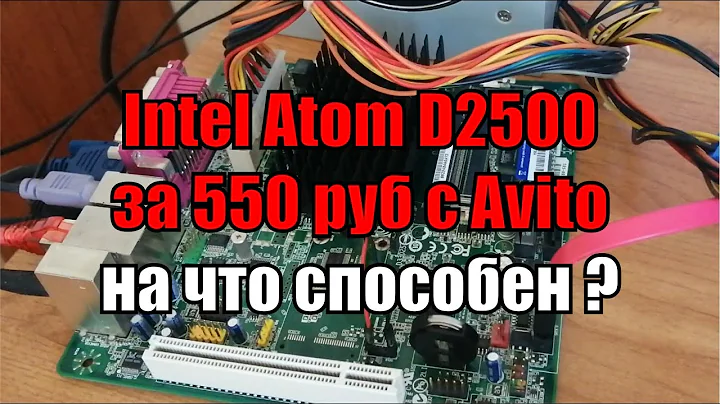Optimize High-Performance Computing with Intel One API Libraries
Table of Contents
- Introduction
- Overview of Performance Libraries
- Intel One API Toolkit
- Intel One API Base Toolkit
- Intel One API HPC Toolkit
- Intel API Libraries
- Intel API Library
- One API MK Library
- Data Analytics Library
- Collective Communication Library
- Deep Neural Network Library
- Intel One MKL (Math Kernel Library)
- Features and Functions
- Optimization for CPUs and GPUs
- Performance Examples
- Intel One DAL (Data Analytics Library)
- Benefits and Integration
- Algorithms for Data Transformation and Analysis
- Distributed Processing and GPU Optimization
- Intel OneDNN (Deep Neural Network Library)
- productivity and Performance Improvement
- Support for CPUs and GPUs
- Open Source Nature and Collaborations
- Intel MPI Library
- Seamless Network Interface
- Optimization for Collectives and Underlying Networks
- Runtime Improvements and Pinning
- Intel OneCCL (Collective Communication Library)
- Communication Library for Machine Learning
- Integration with MPI and OFI API
- High Scalability for ML and DL Frameworks
- Conclusion
- Resources
🚀 Highlights
- Intel offers a range of performance libraries through its One API toolkit.
- The libraries, such as Intel MKL, DAL, DNN, MPI, and CCL, are designed to optimize various aspects of high-performance computing.
- Intel One MKL provides optimized functions for linear algebra, fast Fourier transform, random number generation, and more, with support for CPUs and GPUs.
- Intel One DAL is a data analytics library that accelerates data analysis tasks through pre-processing, transformation, analysis, modeling, and validation.
- Intel OneDNN helps improve productivity and performance of deep learning applications, supporting development for CPUs and GPUs.
- Intel MPI Library offers a seamless interface for accessing various network types, optimizing collective communication operations for HPC codes.
- Intel OneCCL is a communication library focused on machine learning and deep learning frameworks, providing scalability without the need for additional parallelization with MPI.
📝 Article
Introduction
In the world of high-performance computing (HPC), having efficient and optimized libraries is crucial for achieving optimal performance. Intel, a leading provider of computing solutions, offers a suite of performance libraries through its One API toolkit. These libraries, collectively known as Intel One API libraries, are designed to streamline development and enhance performance in various HPC applications. In this article, we will explore the different Intel One API libraries and their key features.
Overview of Performance Libraries
Performance libraries play a vital role in optimizing HPC applications by providing ready-to-use, highly optimized functions and algorithms for computationally intensive tasks. Intel understands the importance of these libraries and offers a comprehensive set of libraries in its One API toolkit.
The Intel One API toolkit comprises two main toolkits: the Intel One API Base Toolkit and the Intel One API HPC Toolkit. The Base Toolkit includes libraries that cover a wide range of development needs, while the HPC Toolkit focuses specifically on accelerating high-performance computing tasks. These toolkits provide developers with a wide range of options to choose from, depending on their specific requirements.
Intel API Libraries
Within the Intel One API toolkit, there are several individual libraries that cater to different aspects of HPC development. These libraries include the Intel API Library, One API MK Library, Data Analytics Library, Collective Communication Library, and Deep Neural Network Library. Let's take a closer look at each of these libraries and their functionalities.
Intel One MKL (Math Kernel Library)
The Intel One MKL, formerly known as the Math Kernel Library (MKL), is one of the most widely used scientific libraries in the HPC community. It provides optimized functions for linear algebra, sparse linear algebra, fast Fourier transform (FFT), random number generation, and statistics. These functions are available in C++, Fortran, and C, making it compatible with a wide range of programming languages.
One of the key advantages of the Intel One MKL is its ability to Scale from single-core to multi-core, multi-socket, and even multi-node clusters. This scalability allows developers to leverage the power of modern Parallel architectures efficiently. Additionally, the library includes optimizations for both CPUs and GPUs, enabling developers to take full advantage of the available hardware resources.
The Intel One MKL also features an internal dispatcher that assesses the level of support for specific hardware features at runtime. This intelligent dispatcher selects the most effective version of functions based on the runtime environment, ensuring optimal performance on different architectures.
Pros:
- Extensive functionality for linear algebra, FFT, random number generation, and statistics
- Scalability from single-core to multi-node clusters
- Optimizations for both CPUs and GPUs
- Intelligent dispatcher for runtime optimization
Cons:
- Limited support for non-Intel GPUs
Intel One DAL (Data Analytics Library)
The Intel One DAL, or Data Analytics Library, is specifically designed to speed up data analysis tasks by providing highly optimized algorithmic building blocks. These building blocks cover all stages of data analytics, including pre-processing, transformation, analysis, modeling, validation, and decision making.
The Intel One DAL supports batch and online processing modes, as well as distributed processing. This flexibility allows developers to choose the most suitable processing mode for their specific data analytics requirements. Moreover, the library seamlessly integrates with popular Python libraries such as NumPy and pandas, making it easier for Python developers to leverage the power of the DAL.
If you are using popular machine learning frameworks like scikit-learn, Apache Spark, or XGBoost, you can also download special versions of these frameworks that include integration with the Intel One DAL. This integration provides enhanced acceleration and performance for data analytics tasks.
Pros:
- High performance and optimization for data analytics tasks
- Integration with popular Python libraries and machine learning frameworks
- Support for batch, online, and distributed processing modes
Cons:
- Limited support for non-Python languages
Intel OneDNN (Deep Neural Network Library)
The Intel OneDNN, formerly known as the Deep Neural Network Library (DNNL), is a powerful library that helps developers improve the productivity and performance of deep learning applications. It offers a unified API to develop code for both CPUs and GPUs, allowing developers to switch between architectures seamlessly.
OneDNN is fully open source, which means developers can access the source code, review it, and propose optimizations and enhancements. This open collaboration has led to contributions from various organizations, resulting in significant performance improvements.
The library includes various optimized algorithms for compute-intensive operations, memory bandwidth-limited operations, and data manipulation tasks. It supports both CPUs and GPUs, specifically targeting Intel Xeon processors and Gen9 and Gen12 GPUs. The ability to optimize for different types of hardware architectures makes OneDNN a versatile choice for deep learning developers.
Pros:
- Improved productivity and performance for deep learning applications
- Support for both CPUs and GPUs, with seamless switching between architectures
- Open source nature allows for collaboration and optimization
Cons:
- Limited support for non-Intel GPUs
Intel MPI Library
The Intel MPI Library is a crucial building block for parallel computing and high-performance computing. It provides a seamless interface for accessing various networking technologies, such as Ethernet, Omni-Path, InfiniBand, and Rocky. The library relies on the Open Fabric Interface (OFI) for low-level functions, ensuring efficient communication across different networks.
One of the key optimizations of the Intel MPI Library is its focus on collective communication operations. It implements specific algorithms that take advantage of hardware-level optimizations available on the underlying networks. This results in reduced latency and increased bandwidth, delivering high-performance communication for parallel codes.
The Intel MPI Library also offers runtime improvements, such as process pinning and GPU pinning, enabling developers to maximize the performance of their applications. These optimizations ensure that processes and GPUs are efficiently utilized, avoiding performance bottlenecks.
Pros:
- Seamless interface for accessing various networks
- Optimizations for collective communication operations
- Runtime improvements for process and GPU pinning
Cons:
- Requires familiarity with parallel computing concepts
Intel OneCCL (Collective Communication Library)
The Intel OneCCL, or Collective Communication Library, is specifically designed for machine learning and deep learning frameworks. It allows developers to take advantage of multi-CPU, multi-GPU, and even multi-node setups without the need for additional parallelization using MPI.
OneCCL leverages the power of MPI and OFI to achieve high scalability and performance in machine learning and deep learning codes. It provides a high-level API that simplifies the development process, while still benefiting from the underlying scalability optimizations. This approach ensures that developers can focus on their algorithms and models without being burdened by the complexities of parallelization.
Pros:
- Communication library for machine learning and deep learning frameworks
- Integration with MPI and OFI for scalability and performance
- High-level API for Simplified development
Cons:
- Limited to machine learning and deep learning applications
Conclusion
The Intel One API libraries offer a comprehensive set of tools for optimizing and accelerating high-performance computing applications. With libraries like Intel MKL, DAL, DNN, MPI, and CCL, developers have access to highly optimized functions and algorithms for various tasks, ranging from mathematical computations to data analytics and deep learning. By leveraging these libraries, developers can achieve significant performance improvements and speed up their time to insights.
Resources
FAQs
Q: Can I use the Intel One API libraries with non-Intel processors?
A: Yes, most of the Intel One API libraries, such as MKL, DAL, and DNN, are compatible with both Intel and non-Intel processors. However, some optimizations may be specific to Intel architectures.
Q: Are the Intel One API libraries free to use?
A: Yes, the Intel One API libraries are available at no cost for both commercial and non-commercial use.
Q: Can I contribute to the development of the Intel OneDNN library?
A: Yes, the Intel OneDNN library is open source, and developers are encouraged to contribute to its development and optimization.
Q: Can I use the Intel One API libraries with other programming languages besides C and C++?
A: Yes, the Intel One API libraries support multiple programming languages, including Fortran and Python.
Q: Are there any examples or tutorials available for the Intel One API libraries?
A: Yes, Intel provides extensive documentation, examples, and tutorials for each of the Intel One API libraries on their official website.
Q: Can I use the Intel One API libraries for both batch and online data processing?
A: Yes, the Intel One API libraries, particularly the DAL, support both batch and online data processing modes, allowing developers to choose the most appropriate mode for their applications.
 WHY YOU SHOULD CHOOSE TOOLIFY
WHY YOU SHOULD CHOOSE TOOLIFY

























